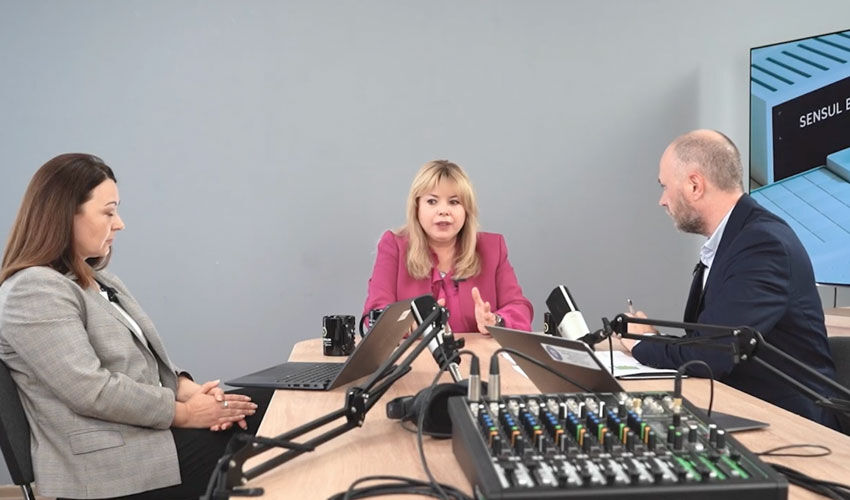
“Saving is not a limitation, saving is a step towards freedom,” says Anca Dragu. “Having a financial safety cushion, at least three to six months’ worth of spending, gives you the ability to make decisions without fear. When you have savings, you can afford to change jobs, take a break, take a risk on a new project. It’s the freedom we allow ourselves.”
According to the governor, many still believe that saving doesn’t make sense because of inflation, but this perception “no longer corresponds to reality”. “If inflation is 50% or 100%, obviously saving becomes impossible. But in Moldova today inflation is stable – around 7%. Bank interest rates are comparable and money is not devaluing as in the past. We are working to maintain this balance: so that inflation does not discourage investment, but at the same time allows saving.”
Financial behavior, says Anca Dragu, is closely linked to psychology. People often shop on emotion rather than reason. “It’s an internal dialog between emotion and reason. We buy to make ourselves happy, but a day later we regret it. If we directed that same energy not towards impulse buying but towards small but regular savings, life would become more peaceful.”
Galina Cicanci adds: financial discipline starts with a simple gesture – distributing income. The three-envelope method remains one of the most effective: part of the money goes to essential spending, part to pleasure, part to savings. “When you do it systematically, financial stability comes naturally,” she says.
Anca Dragu emphasizes that the basis of financial culture is formed in childhood.
“I remember how parents divided the paycheck into categories – food, house, children, savings. There were no financial education courses, but there was common sense. That’s what we need to show children: not just saying ‘we don’t have money’, but explaining how to make decisions, how to look for alternatives. Conversations like that build a child’s sense of control and responsibility – not fear of money, but respect.”
According to World Bank data, only 7% of Moldovans keep money in bank accounts and 41% have at least some savings. But only 2% save for old age. “Deposits are the most popular and simplest tool,” explains Galina Cicanci. “But people should also pay attention to pension plans, investment funds, insurance savings products. They can protect money from depreciation. The important thing is to understand the notion of liquidity: part of the money should be accessible quickly, and another part – to work for the future.”
A separate topic of discussion was the role of women in the financial system. “In most families, women are the ones who manage the budget,” says Cicanci. “But many lack access to modern financial services, especially in rural areas. Yet almost every woman wants economic independence – her own savings, the ability to decide for herself.”
Anca Dragu adds: “Women make more small but rational decisions. They bring discipline and long-term thinking. If women participated in the economy at the same level as men, global GDP would grow by trillions of dollars.”
The IFC actively promotes women’s participation in business. The institution has launched the world’s first gender bond – bonds whose funds are earmarked exclusively to support female entrepreneurship. The IFC is also introducing quotas in its lending lines: 40-50% of its resources are directed to women-owned businesses.
A key part of the discussion focused on digitalization. Today, “banking is on the phone”. This makes finance more accessible, especially in areas without branches, but also increases risks. Anca Dragu warns: “Many pseudo-investments and fraudulent schemes have appeared promising fantastic profits. We must understand: banks do not promise miracles. If someone offers a huge gain, that is already a red flag.”
Moldova’s banking system currently has more than 80 billion lei in deposits of the population – about a quarter of GDP. “This shows confidence in banks and in the national currency,” Dragu emphasizes. According to the IFC, Moldovans save more often than residents of other countries in the region – and not out of fear, but out of a desire for stability. “On average, savings cover two months of spending,” says Cicanci. “This means not only rich people are saving, but also middle-class people – a very positive thing. The important thing is that saving becomes a habit, not a temporary reaction.”
At the end of the discussion, participants formulated three simple principles that underpin financial stability: start early, have a plan and be disciplined. “Banks don’t make us happy, but they enable us to feel secure,” says Anca Dragu. “Money is not a goal or a fear. They are a tool to help us be more free.”
VIDEO podcast: https://shorturl.at/Yy6Ur
Economic Press Club

